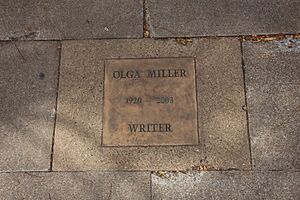Olga Miller facts for kids
Quick facts for kids
Olga Miller
|
|
|---|---|
| Born |
Olga Eunice Wondunna
March 27, 1920 |
| Died | August 2003 (aged 83) |
| Occupation | Historian, artist, author and Aboriginal elder |
Olga Eunice Miller (born Wondunna, later Reeves; 27 March 1920 – August 2003) was a very important Australian woman. Many people knew her as Aunty Olga or by her traditional name Wandi. She was a historian, artist, and author. Olga was also an Aboriginal elder of the Butchulla people.
Aunty Olga often spoke up for K'gari (Fraser Island) and for the Butchulla people. She also drew the pictures for The Legends of Moonie Jarl. This was the first children's book known to be written by an Aboriginal Australian. In 2002, she was honored as a Queensland Great.
Contents
A Young Life in Queensland
Olga Eunice Wondunna was born on 27 March 1920. She was the youngest of seven children. Her birthplace was Maryborough, Queensland. Her parents were Ethel Marion Reeves and Frederick Wondunna.
Later, Olga changed her last name to Reeves. On 1 June 1940, she married Ronald Richard Miller and took his name.
Her Family and Heritage
Olga was a member of the Butchulla people. Her grandfather, Willie Wondunna, was an important leader for them. Today, her son Glen is also an elder.
Her mother's father was J. B. Gribble. He was a missionary from England in the 1800s. He was known for working with Indigenous Australians. Olga's grandniece, Fiona Foley, is also an artist. She helped start the Boomalli Aboriginal Artists Cooperative.
Olga's Amazing Career
Olga Miller worked in many different ways. She wrote for school textbooks and newspapers. She also helped with animated films and spoke on the radio.
Illustrating Children's Stories
In 1964, Olga drew the pictures for The Legends of Moonie Jarl. Her brother, Wilf Reeves, wrote this book. It was the first children's book known to be published by an Aboriginal Australian. Olga used her traditional Butchulla name, Wandi, for her illustrations. Wandi means "wild duck."
Speaking Up for the Land
Aunty Olga was also an activist for K'gari (Fraser Island). She often gave advice to people who wanted to build there. She said she "made a nuisance of herself" to protect the land. Olga explained that she was "not interested in money… just looking after the land."
Keeper of Records
Olga was the Caboonya of the Butchulla people. This means she was the keeper of their records and history. Her grandfather gave her this special role. She knew a lot about Aboriginal culture and history. People often asked her for advice on Indigenous issues. The Queensland Government said she taught non-Indigenous Australians about history before Europeans arrived. She also taught Aboriginal people about their own culture.
Honors and Awards
Olga Miller received several important awards for her work.
Centenary Medal and Queensland Great
On New Year's Day in 2001, she received a Centenary Medal. This was for her "services to reconciliation and the preservation of Aboriginal history."
In 2002, she was named a Queensland Great. This award celebrates people who have made a huge difference to the history and growth of Queensland.
University Recognition
In April 2003, the University of Southern Queensland (USQ) gave her an honorary fellowship. This was a special award from the university. Olga had helped create Buallum Jarl-Bah at their Fraser Coast campus. This center helps Indigenous students learn.
Her Lasting Legacy
Olga Miller passed away in August 2003 in Maryborough. Chris Foley, a politician from Maryborough, spoke about her death in the Queensland parliament.
In December 2009, USQ named a garden after her. It is called the Olga Miller Memorial Garden. This garden and the Buallam Jarl-Bah center are still at the campus. The campus is now part of the University of the Sunshine Coast.
 | Isaac Myers |
 | D. Hamilton Jackson |
 | A. Philip Randolph |


